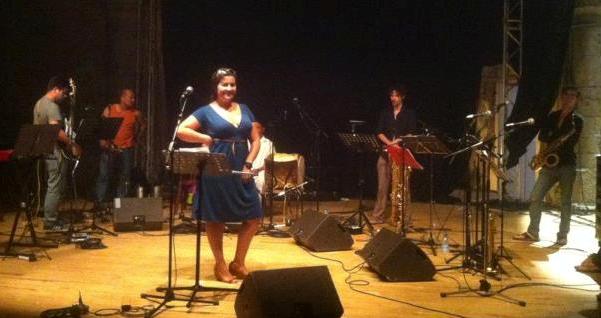
July 2013 – informal translation
With their debut Cumbia Insomnia, Maguaré in Ghent delivered a very nice cumbia album. We met the leader Paola Márquez at Café Zeezicht in Antwerp and asked her for more information and explanations. Whoever wants to see Maguaré live can go to Ghent to see Polé Polé on July 21 and from August 14 to 18 to Antwerp, where the band will perform at various venues on the occasion of the Antwerp Summer.
Paola Márquez (vocals): “Yes and no…. What in the rest of the world is known as cumbia is actually an amalgam of different Colombian genres that came together. It is true that the cumbia rhythm takes different forms spread throughout Latin America. America.”
You yourself come from Colombia, how exactly did you come to Belgium?
Paola Marquez: “I came here a little over ten years ago to continue my studies at the University Conservatory of Ghent. In Colombia I could only follow a classical music education and I was looking for other ways to use my voice. Someone suggested I come. “I moved to Ghent and finally enrolled in a vocal jazz course. I immediately felt at home here and quickly met several interesting musicians, so I decided to stay.”
How did the whole Maguaré adventure really start?
Paola Márquez: “Maguaré was initially our conservatory graduation project, but because we received so much positive feedback from the beginning, we decided to continue with it and today we can proudly present our first album.”
How difficult is it for an eleven-piece cumbia group to get work in Belgium?
Paola Marquez: “It’s certainly not easy, but we’ve been very lucky so far. Cumbia is becoming more and more popular in Europe and as we are the only band in Belgium that brings the genre to life in a complete way, we can certainly make a difference there. Belgium also has quite an extensive festival circuit which is very suitable for a band like ours. Also, we are not too afraid to cross national borders, because with this kind of music you can also do it in France, the UK or Germany, with good reason.”
What does the word “maguaré” refer to?
Paola Márquez: “Maguaré is the name of a drum used by several indigenous tribes (the Uitoto, Siona and Cofán, ed.) in the Amazon region of Colombia and serves to gather tribal members from surrounding areas for celebrations or ceremonies. That concept of bringing people together appealed to us.”
Cumbia Insomnia also contains some tracks with a Belgian link (Dominique de Soeur Sourire and Jungle Fever by The Chakachas, ed.). Did you think it was important to give the album a Belgian touch?
Paola Márquez: “Maguaré is made up of Belgian and Colombian musicians, so we thought it was natural that this was also reflected in the album.And people are always pleasantly surprised when we start playing our version.”
Aníbal Velásquez already had a hit with his lagenato adaptation of the song in the 1970’s. Did you know his version?
Paola Marquez: “No, curiously enough, it was Jan ( Verstaen, saxophone, ed.) who introduced me to that song and also suggested including it in our repertoire.”
For the production of Cumbia Insomnia you called Colombian professionals such as Mario Galeano (Ondatropica, Frente Cumbiero) and Eblis Alvarez. (Ondatropica, Meridian Brothers) Where did you meet them and why did you think it was important to involve them in the album?
Paola Márquez: “I have known them both for many years; Eblis since my childhood and I went to university in Bogotá together with Mario for a while. They are both professionals in what they do and with their Colombian background they knew exactly what our music needed. I think they have really managed to bring the essence of Maguaré’s music to the surface.”
The last song on the album is a successful remix of Ritmo De Juventud by Renegades Of Jazz from Hamburg (David Hanke, ed.). Didn’t that leave you? Want more?
Paola Marquez: “I don’t know if we will have the whole album reworked, but we certainly plan to have some more tracks remixed, not only by Renegades Of Jazz, but also by other artists. I thought that Ritmo De Juventud remix was really successful and as an artist it’s always interesting to hear what others do with your music.”
Do you have plans to go to Colombia with Maguaré?
Paola Márquez: “Absolutely, that’s one of my big goals, but it’s not as easy as it seems. Still, I think we are ready and our collaboration with Mario and Eblis can still be an advantage for us, as both of them have already made a name for themselves in the Colombian music scene.”



